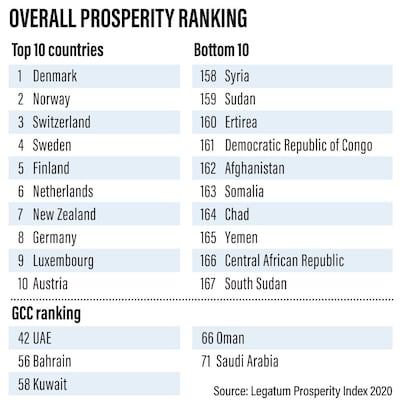The UAE maintained its position as the most prosperous Arab nation for the 14th year in a row, while Europe dominated the global leader board, according to the latest Legatum Prosperity Index.
The Emirates scored highly for its open economy, particularly its enterprise conditions, market access and infrastructure, putting the nation in 42nd position out of 167 countries.
Meanwhile, Denmark led the global index, with European nations taking nine of the top 10 spots and the UK coming in 13th place.
The index, now in its 14th year, assesses how well countries promote the economic and social well-being of their residents in three domains: inclusive societies, open economies and empowered people.
"The UAE has seen an improvement in four rankings over the past decade, which means it has improved its prosperity, but relative to other countries, it's improved faster … and we see that particularly being driven by improvements in the open economies domain," Shaun Flanagan, director for metrics at the Legatum Institute, told The National.
The 2020 index, which reflects data collected prior to the pandemic, shows that global prosperity stood at a record high before the crisis. A total of 147 countries have experienced rising prosperity levels over the past 10 years, driven mainly by improvements in health, education, living conditions and more open economies.
However, the improvement slowed in the 12 months leading up to the pandemic, due to stagnating progress in the Asia-Pacific – the traditional driver behind rising prosperity levels – on areas such as safety and security, personal freedom, economic quality and education. Western Europe and North America also experienced slowing improvements.
While 86 per cent of the global population lived in countries that experienced increased prosperity in 2017 and 2018, this slowed to 61 per cent in 2019 and 2020.
Mr Flanagan said data from sources such as the World Economic Forum and the World Bank indicate a drop in business confidence in some of these regions, particularly in the UK and North America.
“In the UK, for example, which came 13th on the list, there is uncertainty around Brexit and what the future is going to hold," he said.
“But in the US, it’s more difficult to pinpoint, but experts are raising some concerns about confidence in labour market flexibility and the ability for businesses to be able to access credit and finance.”
The index also highlighted warning signs for the UK's ability to protect and build its prosperity, with personal and family relationships deteriorating over the past 10 years.
In addition, public confidence in national government has been in decline and is now among the lowest levels seen across the world, "reflecting a significant decline in government effectiveness since 2017", the rankings found.
The global economy is expected to contract by 4.4 per cent this year due to the economic fallout over the coronavirus pandemic, according to the International Monetary Fund. The Washington-based lender sees the world economy rebounding to 5.2 per cent in 2021.
IMF chief Kristalina Georgieva said last week that governments must be wary of withdrawing fiscal and monetary policy support "prematurely" to avoid hampering the global recovery.
This year has presented the biggest challenge to the world economy since the Second World War and Great Depression, Ms Georgieva said.
Philippa Stroud, chief executive of the Legatum Institute, said that while the index showed that global prosperity was at its highest ever level, there were also some warning signs for the West.
“The Western world must beware of the trap of falling into a mindset of an overdeveloped society, vulnerable to entitlement and complacency,” she said.
“This is a dark moment of global emergency, but we must not focus solely on the immediate crisis or we will limit future prosperity. Never has it been more important for leaders to recognise the holistic nature of prosperity and make strategic choices to further build inclusive societies and more open economies.”
A closer look at the Middle East and North Africa suggests that sustained instability across the region means progress on prosperity since 2010 has been slow, and the region as a whole has underperformed against the global average.
However, further expansion of telecommunications infrastructure was noted as an improvement, with the average number of broadband subscriptions per capita almost quadrupling in the last decade.
Another positive has been consistent improvement in education, with only Jordan and Syria deteriorating.
“For most countries, this has been due to an improvement in tertiary education, with enrolment rates across the region increasing from 32 per cent to 44 per cent since 2010,” the index said.
Looking ahead, Mr Flanagan said the effects of Covid-19 will hamper several aspects of the index next year, particularly open economies due to travel restrictions, and living conditions as people lose their jobs.
“The ability to access income is going to be affected, along with health and education, and we’ll see the effects of that coming through next year,” he said.



